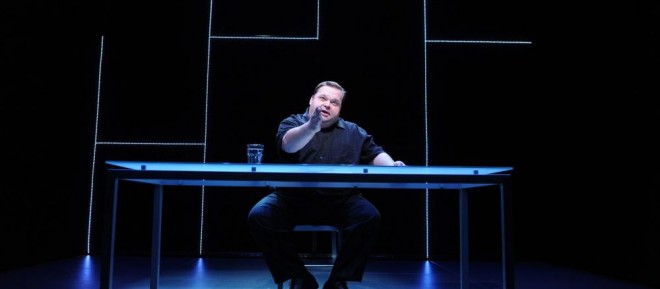The dark side of Steve Jobs
An off-broadway show in New York looks at what it takes to make all those iPods
Share
 In what seems like an endless stream of Steve Jobs tributes and devotions, one voice stands out as a reality check. Mike Daisey, New York-based author and monologuist, is hoping to cut through the nostalgia and remind people of the nastier side of Jobs’ legacy.
In what seems like an endless stream of Steve Jobs tributes and devotions, one voice stands out as a reality check. Mike Daisey, New York-based author and monologuist, is hoping to cut through the nostalgia and remind people of the nastier side of Jobs’ legacy.
“I’m almost tired of hearing what a genius he is,” says the 37-year-old creator and performer of The Agony and Ecstasy of Steve Jobs, a one-man show about the life and work of the former Apple CEO that opened off-broadway at the Public Theater in New York City on Tuesday. “I think he’d be disgusted by this level of nostalgia. He was a very unrelenting, unwavering person—focus was really the centre of his skill set, his genius.”
Daisey’s show touches on everything from Jobs’s mastery of industrial design to the objectionable practices of iPhone and iPad manufacturing plants in China. The monologue tells the story of Jobs’s obsessions and his impact on humanity—from Silicon Valley to Shenzhen. Daisey’s style is semi-improvised, or what he calls “extemporaneous monologing”—which means the show differs from night to night, often depending on the mood of the room. “The work happens in the room so it’s hard to say what is going to change,” says Daisey. “At the same time, the fundamentals of the story aren’t affected by his death. In fact, they’ll be amplified. The end of an era, the loss of individual personal power in the face of corporatism.”
Daisey’s first performance of The Agony and Ecstasy met critical acclaim following its debut in Berkeley over one year ago. Steve Wozniak, Apple’s co-founder, told the New York Times, “I will never be the same after seeing that show.” The Washington Post called the show “blisteringly funny” and the New York Times has called Daisey “one of the finest solo performers of his generation.” Now, as he launches his New York run, Daisey’s catching some unexpected publicity following Jobs’s death. While he acknowledges the mood of his audience may be “charged,” he says he didn’t think twice about keeping the show going.
“A lot of my work in this particular monologue is breaking down people’s defenses so we can actually talk about the truth of China, of manufacturing. The stuff we never ever talk about—that we go to any length not to talk about.”
Daisey—a self-confessed iPhone addict—developed the show following his own undercover investigation of Foxconn, one of Apple’s manufacturing plants in China, now famous for its high suicide rates. Two years ago, he traveled to China and managed to tour the facilities by posing as an American businessman. He discovered dreadful labour conditions and tales of human rights abuses that confirmed the worst of what he’d read in online reports.
“I have personally talked to hundreds of people whose joints in their hands have disintegrated from working on the line over and over again,” says Daisey, who also discovered workers as young as 13 at Foxconn. Many of the workers logged 16-hour shifts, and some never left the factory—sleeping in small rooms crammed with bunk beds. “I think, if there’s any justice in the world, then [Jobs’s] legacy will share in its description the fact that he was a manufacturing industrialist in this age. And that means that he made the choice to export all of his jobs to China. Sending the jobs there but none of our values, and exploiting people who live under a fascist government.”
Prior to Jobs’s death, Daisey used to hand out cards with Jobs’s email address on them at the end of his shows, encouraging audience members to email the Apple CEO with their questions and concerns. Some of them did, and Jobs—as he was known to do—occasionally responded. In some cases, he pointed them to Apple’s Supplier Responsibility Report online. To others, he wrote, “Mike doesn’t understand the complexity of the situation.” Even in defending what Daisey feels is indefensible, Jobs was just as Daisey describes him: unrelenting and unwavering.